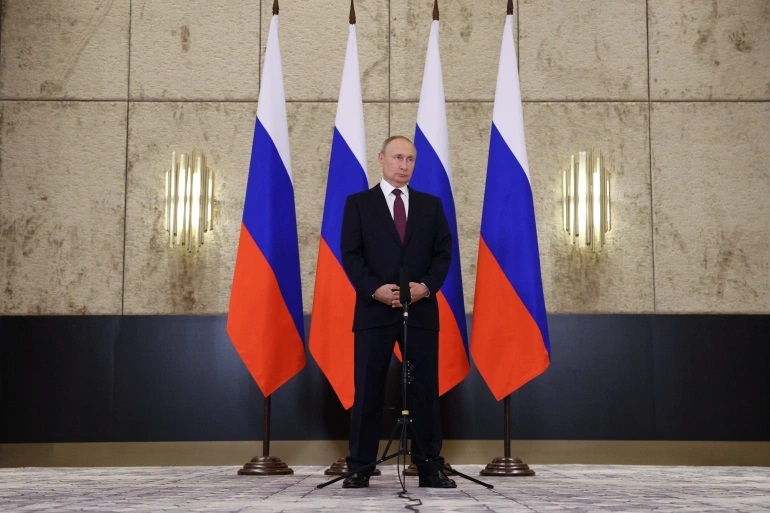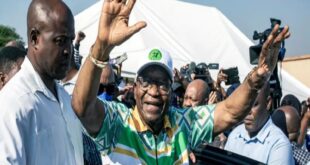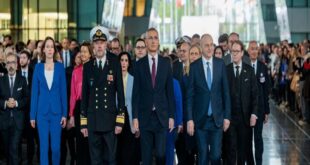
Those whom the Russian president may perceive as allies do not seem to be eager to back his brutal war in Ukraine.
On September 30, Russian President Vladimir Putin unleashed a cri de coeur, a simultaneously blistering and blathering speech. Quoting fascist philosopher Ivan Iyin, Putin cast himself as the hero leading a global fight against the West in general, and American hegemony in particular. But rather than mark the start of a new epochal conflict, the speech instead laid bare the extent to which the Russian president has lost touch with reality.
The declaration was intended to mark a high point in the “success” of his “special operation” against Ukraine, namely the attempted annexation of Ukraine’s Donetsk, Luhansk, Zaporizhia and Kherson regions – though Russian forces are not in full control of any of them. What Putin planned in February as a blitzkrieg has instead come to be mocked as а bly*tkrieg, substituting blitz, the German word for lightning, with a Russian curse word whose translation is not publishable here.
While the horrors of the conflict are no laughing matter, that Putin is blind to the tragicomic reality of the fighting was made clear when Ukrainian forces retook the city of Lyman in Donetsk Oblast within 24 hours of his diatribe. Lyman has been of strategic importance due to its position as a railway juncture, but now it has also taken on a symbolic significance – all thanks to the fact that Putin could no longer keep his anger to himself.
A week later, an explosion struck the Kerch Bridge which Putin had ordered built to link the Russian mainland with the Russian-occupied Crimean Peninsula. The bridge was arguably the project which the Kremlin had used to propagandise its occupation regime more than any other and which pro-Kremlin media had previously painted as impervious to attack.
Putin has long been critical of the so-called “rules-based order” and US hypocrisy on the use of force abroad. He first brought up these ideas in his 2007 speech at the Munich Security Conference. Back then, he was still willing to call the US and other Western states “partners” – language he has now explicitly cast aside. His descent into hyperbole continued with two essays, published in 2020 and 2021, reimagining World War II to blame the West for Hitler’s attacks on Eastern Europe while absolving Russia of sin for the Molotov-Ribbentrop pact and denouncing Ukrainian nationhood.
How unhinged Putin has become from reality has also been laid bare by one particular point of emphasis in his latest speech, namely: his claim that Russia is leading the charge to resist US hegemony and that the rest of the world is choosing to side with it. But some of the countries that he perhaps perceives as allies – those that have refused to “bow” to US pressure and made the “reasonable choice to cooperate with Russia” – may not be so eager to align with the Kremlin.
Take Iran, which itself is now facing a wave of anti-government protests. The current hardliners in charge in Tehran have not stopped engaging with the West. In fact, they are negotiating with the US and its Western allies a deal to lift the sanctions that former US President Donald Trump unilaterally – and thus hegemonically – re-imposed on the regime.
Meanwhile China – another power that Putin has sought the support of – is also distancing itself from Russia’s war effort. It has no interest in joining Putin’s attempt to upend the global international financial order, dominated by the US dollar, which suits Beijing just fine. It seeks to ultimately displace the US as the dominant player whereas Putin hopes to collapse the present system entirely.
And though Chinese President Xi Jinping too is a fierce critic of the US’ geopolitical power, Beijing has not only been circumspect in its approach to the conflict in Ukraine but has refused to endorse Putin’s position on annexing Ukrainian territory. While the Kremlin often likes to invoke the US-Chinese disagreement over Taiwan as akin to its invasion of Ukraine, there is little chance that Beijing will do the same, let alone recognise Russian sovereignty over the “annexed” territories.
Turkish President Recep Tayyip Erdogan, who has his own issues with the West that he blames for the 2016 coup attempt against him, has so far refused to join Western sanctions on Russia. But of late Turkish banks – some of which have been accused of skirting the sanctions on Iran – have begun to think better of skirting US sanctions on Russia.
A day before Putin’s speech, it was reported that Turkish state banks were no longer willing to use Russia’s MIR payment system, an alternative to the Belgium-based SWIFT interbank messaging system from which most of Russia’s largest banks have been barred.
Ankara has rejected Putin’s annexations explicitly as well, labelling it a grave violation of international law. Meral Aksener, leader of Turkey’s opposition IYI party – which is currently polling third – has also ramped up her rhetoric against the Kremlin, lambasting Putin as destabilising the wider region in the aftermath of his speech.
A similar situation is found in India, which has been willing to boost its imports of Russian oil and other commodities in recent months, but has increasingly shown signs that Moscow’s demands it go further in its support are grating. Oil companies and the Indian government have reportedly been reluctant to adopt a rouble trade mechanism for oil imports. Prime Minister Narendra Modi also made his most significant criticism of the war to date at the Shanghai Cooperation Organisation summit in Uzbekistan on September 16, stating that “today’s era is not an era of war”.
Putin even stands at risk of losing what had been one of Russia’s closest security allies – Armenia – after the Russian-led Collective Security Treaty Organisation (CSTO) refused to support Yerevan following border clashes with Azerbaijan and attacks on its territory. Some senior Armenian officials have even hinted at leaving the bloc altogether.
Kazakhstan’s President Kassym-Jomart Tokayev has sought to distance himself from Putin as well, although Russian forces intervened in the country just this January to help put down a series of protests that were labelled a coup attempt. As some 200,000 Russians have fled Putin’s draft for Kazakhstan over the last two weeks, Tokayev called the crisis in Russia a “hopeless situation”. Meanwhile, amid Russian efforts to draft guest workers from Central Asia, Uzbekistan and Kyrgyzstan have warned their nationals against fighting in the conflict.
Even Tajikistan, whose president was just awarded the Order of Merit for the Fatherland in the third degree by Putin himself, has shown reticence to risk violating Western sanctions on Russian payment systems.
Nor are Putin’s military atrocities and economic mismanagement winning him friends in Africa and the Middle East, where countries have heretofore largely abstained from inveighing on the conflict. But there are signs that the horrors of Russia’s attacks on Ukraine are pushing this neutrality to its limits.
In the Middle East, two large energy exporters, Qatar and Kuwait, have condemned the use of force to settle disputes between countries and have called for respect for Ukraine’s sovereignty and territorial integrity.
In Africa, too, there has been criticism of Russian aggression. In late September Ghanaian President Nana Akufo-Addo told the UN that “Every bullet, every bomb, every shell that hits a target in Ukraine, hits our pockets and our economies in Africa”.
Despite his hopes, Putin fights alone. That may make him even more dangerous. But that in turn will only isolate him further. His war in Ukraine is no civilisational or epochal struggle for the future, but one man’s maniacal desires brought bare because he has systematically and often brutally eliminated the ability for any voice in Russia that speaks out against him to rise up. But his desire to intimidate the world into acquiescing to his barbarity and craven worldview is nothing more than a fantasy. And therein lies hope.

By Maximilian Hess – Fellow at the Foreign Policy Research Institute / Aljazeera




 World Opinions Débats De Société, Questions, Opinions et Tribunes.. La Voix Des Sans-Voix | Alternative Média
World Opinions Débats De Société, Questions, Opinions et Tribunes.. La Voix Des Sans-Voix | Alternative Média




